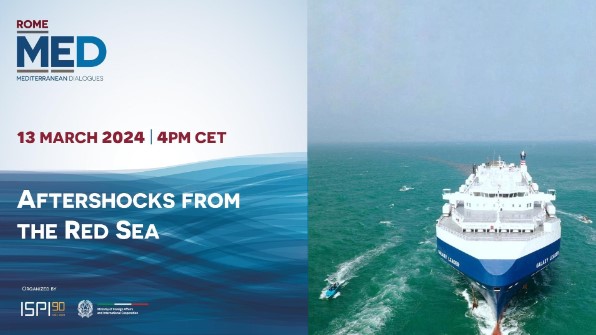Five months after the Houthis began striking commercial and military vessels, the Red Sea is still at the centre of international attention. The offensives launched by the Yemeni group have transformed a local crisis into one of international proportions, triggering profound consequences for maritime security and global trade. This event offers expert analysis and insight into the aftershocks of the Red Sea crisis. It will examine the geopolitical and economic reverberations of the crisis on riparian countries, from the Horn of Africa to the Gulf, as well as its broader ramifications for the wider Mediterranean region and beyond.
Speakers
Guled Ahmed
Non-Resident Scholar, Middle East Institute
Farea-al-Muslimi
Research Fellow, Middle East and North Africa Programme, Chatham House
Eleonora Ardemagni
Senior Associate Research Fellow, Italian Institute for International Political Studies
Lina Raafat
Non-resident scholar for the Countering Terrorism and Extremism Program, Middle East Institute
Detailed Speaker Biographies
Guled Ahmed has more than 15 years’ experience in hydropower, water resources management, and highways infrastructure projects in developing and developed countries. His water resources experience includes drainage and storm water management design, green and sustainable infrastructure planning, H&H modeling of floodplains, bridges and culverts, and GIS-based watershed assessments and planning. Guled has also been incredibly involved as an advocate on Horn of Africa (HoA) water transboundary treaties, cross-border energy and water security, climate change, and Paris Agreement reforms. As an entrepreneur he has founded two renewable energy companies, Power OffGrid and Jiko Biogas, in Somalia. He has developed disruptive, innovative, and affordable smart hybrid renewable energy and asset financing systems, increasing access to electricity, adequate clean water, and clean cooking, improving productivity in sectors in rural and urban areas in Somalia. He is also certified as a Global Juror of SDG11.
Farea Al-Muslimi is a research fellow at Chatham House’s Middle East and North Africa Programme. His research focuses on Yemen and the wider Gulf region. Prior to joining Chatham House, he was a non-resident fellow at Carnegie Middle East Center and the Middle East Institute in Washington, also working at the National Democratic Institute (NDI), Beyond Reforms and Development, and Resonate! Yemen. He co-founded the Sana’a Center for Strategic Studies in 2014, serving as its first chairperson until 2022, and growing the organization into Yemen’s premier think-tank.
Eleonora Ardemagni is a Senior Associate Research Fellow at the Italian Institute for International Political Studies (ISPI), a Teaching Assistant (“History of Islamic Asia”; “New Conflicts”) at the Catholic University of Milan, and an Adjunct Professor at the Graduate School of Economics and International Relations-ASERI (“Yemen: Drivers of conflict and security implications”). She was formerly a Gulf Analyst for the Nato Defense College Foundation. Her research analysis focuses on foreign policy and security issues in Yemen and the Gulf monarchies, and on Arab military forces.
Lina Raafat is a non-resident scholar for the Countering Terrorism and Extremism Program at the Middle East Institute. She previously served as Deputy Research Director at the Chicago Project on Security and Threats (CPOST) where she led a $3.4M multi-year project studying the tactics of the violent extremist nexus for online media radicalization and audience susceptibility. She also briefed policy-makers and key stakeholders at the Federal Bureau of Investigations, the Department of Homeland Security, and the Department of Defense on strategic threat messaging by high-impact extremist actors. Lina currently works at the Cairo International Center for Conflict Resolution, Peacekeeping and Peacebuilding focusing on understanding the interlinkages between Disarmament, Demobilization and Reintegration and preventing extremism conducive to terrorism in Africa.












